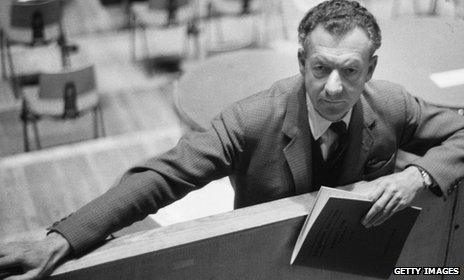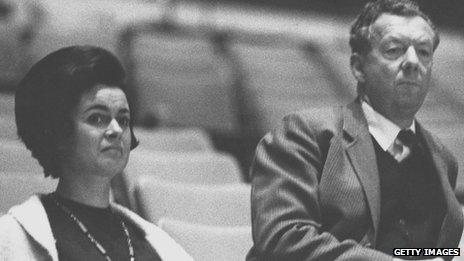Benjamin Britten centenary: Memories of a music genius
- Published

Benjamin Britten was born 100 years ago on 22 November and as events take place around the world to celebrate the work of one of Britain's greatest composers, two people who knew both the man and the musical genius share their recollections.
"I was never frightened of Ben but I had great respect for him. He was a very easy person to get on with but you were careful about what you said about works he either liked or disliked, or his own works. You chose your words carefully!"
In a rare interview with BBC Radio 3's Tom Service, 87-year-old Marion Thorpe reveals her memories of him as a close friend and musical tour de force.
Britten was infamous for his 'corpses' - ruthlessly and peremptorily dropped friends and colleagues. But he was also capable of being a faithful, considerate and sensitive friend. She was one of those who enjoyed a close friendship with Britten which lasted more than 30 years until his death in 1976.
Marion Stein came to Britain from Vienna in 1938 with her parents after the Nazi annexation of Austria. Her father was Erwin Stein, a distinguished musician who knew Mahler and Schoenberg. She recalls meeting Britten for the first time.
"We went to a concert at the Queen's Hall where they played a piece of Ben's. We went afterwards to see him and congratulate him. And he swears that I curtseyed to him, which is what a well brought up young Viennese girl did to grown ups. I don't remember it at all!
"I was impressed but my father knew a lot of musicians. I was quite spoilt by knowing people of distinction."
Her father already knew Britten and became one of his closest colleagues. When a house fire left the Steins homeless in 1944, Britten and and his partner Peter Pears invited them to live at their London flat, where they stayed until 1946. It was there that Marion, who was herself a fine pianist, became friends with Britten.
"I really got to know him well during the Peter Grimes period [Britten's opera, composed in 1945]. At that time we shared an apartment on St John's Wood high street, my parents and I, Ben and Peter Pears. It was exciting as he played bits of it and we sang parts in bad voices.
"We played [piano] duets together quite often, Peter and my father, me and Ben in various combinations, four-handed. It could be quite frightening.
"I thought he was a great composer… all the other composers were rather jealous of him. I was his great champion. My music mistress at school didn't approve of me liking him at all!
"He had this extraordinary gift of getting right into the middle of the music, straight from the brain to the fingers. He heard it in his mind and it went straight into playing. He hardly practised at all."
She says that behind the great composer was a man who enjoyed life and had fun - but would not suffer fools gladly.

Marion Stein and Britten listening to his Voices for Today cantata in 1965
"One behaved in a certain way to his personality which was very simple but very powerful. I was aware of his musical powers but otherwise he was a lot of fun. We laughed a lot. He told terrible schoolboy jokes. I think now he often comes across as being very serious, but he wasn't at all, he had a great sense of humour.
"He did have lots of dead bodies. When people demanded too much of him or wanted to get closer than he wanted, and if musically they didn't come up to what he had in mind, he would drop them. It was very cruel for the people concerned.
"My friendship with him did last a long time… it was marvellous. I don't know what I did right!"
'Warm-hearted person'
Sally Schweizer is Benjamin Britten's niece and has fond recollections from her childhood and beyond. She was born in the Suffolk home he lived in and was living next door to him when he died.
"He was my uncle. I had no idea as a young child how famous he was. What we had was great fun and there was so much love. We went for picnics, walks, went swimming often. And he liked to take us in his cars - he had a lot of fast cars," she told the BBC News website.
"Uncle Ben loved speed and he loved funfairs and the scenic railway - not going on it just once, but two or three times.
"He was an extraordinary genius and it was remarkable what he achieved in his relatively short life. His music was so full of lovely tunes, so singable, which will help to keep his musical memory alive.
"He had time for his family, his friends, wrote masses of letters. He was so full of vitality but was ill for most of his life. He was a very gracious man and found time for people's troubles.
"He was a very welcoming, warm-hearted person and full of praise for others. That side of his personality must go down in history as well."
Ms Schweizer says that as she grew up, she began to see Britten differently, becoming more aware of his musical genius and revering it.
"When I was about 20, I was thinking about making music my career, and he asked me to sing for him. But I was too shy and didn't want to do it.
"Being surrounded by such extraordinary people, I wondered what the point was. But I went on to do music with children and he was very encouraging."
She will spend the anniversary at Glyndebourne watching a performance of their youth choir, singing Into the Harbour, Carry me Home.
"My uncle was committed to getting children and teenagers involved in music-making so this performance, which the young people have helped to create, is a perfect tribute," she says.
But the composer's niece is in a sense relieved that Britten will never be subjected to a scourge of modern life a century after his birth.
"I don't know how he would have survived now with muzak everywhere - he wouldn't have coped!"
- Published22 November 2013
- Published14 June 2013
- Published13 May 2013
- Published10 November 2013